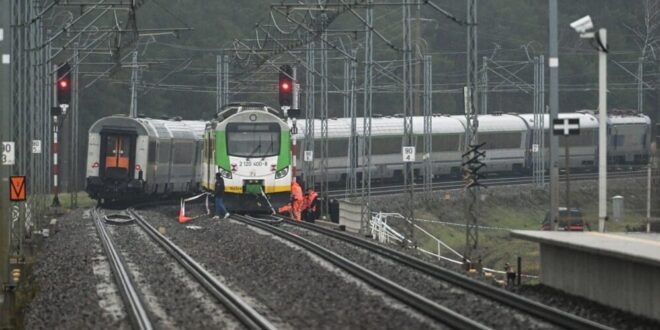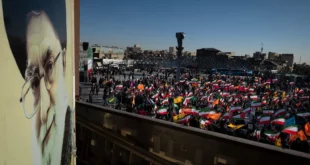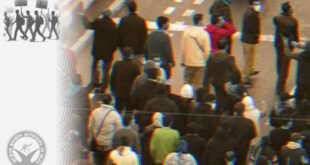The Polish National Prosecutor’s office said on Wednesday that it has drafted charges against two Ukrainian men accused of carrying out last weekend’s sabotage attacks on the rail network, though the suspects have not been charged in person given they fled to Belarus on Sunday, TVP World reported. The charges relate to the planting of military-grade explosives and a steel clamp on rail tracks in two incidents on a strategic rail route used for delivering aid to Ukraine. The explosive device went off on Saturday night under a freight train, which suffered damage to its undercarriage, and damaged the tracks, posing a risk to other trains taking that route, noted PM Donald Tusk. “We are dealing with an act of sabotage, the consequence of which could have been… a serious catastrophe with casualties. That is why I am saying that a certain line has been crossed,” Tusk told parliament on Tuesday. Prosecutors said they have ample evidence that Oleksandr K. and Yevhenii I., whose surnames were withheld under privacy laws, committed acts of terrorist sabotage on behalf of Russian intelligence. The Foreign Ministry announced the closure of Russia’s last consulate in Gdansk in response to the sabotage. Meanwhile, a Russian couple charged with spying against Poland were granted refugee status in the country not long before their arrest, Rzeczpospolita reported. Igor and Irina R. are said to have applied for refugee status in 2023, which was granted in January 2024, six months before Igor R. was detained over spying for Russia’s Federal Security Service (FSB) and charged with helping to send a parcel bomb containing nitroglycerin and military-grade detonators via courier. The pair’s trial will begin on December 8, with potential sentences ranging from eight years to life imprisonment.
In other news, the “Polish-German Barometer” – a regular survey exploring topics such as bilateral relations and current political developments carried out by the Institute of Public Affairs, the German-Polish Institute, the Konrad Adenauer Foundation and the Foundation for German-Polish Cooperation – found that Polish attitudes towards Germans have hardened over the last three years. In the latest survey published on Thursday, 32 per cent of Poles said they like Germans, down from 50 per cent in 2022 and near the record low of 30 per cent recorded in 2008. Meanwhile, 25 per cent said they dislike Germans, up from 15 per cent in 2022 and near the record high. By contrast, among Germans, positive sentiment towards Poles, at 42 per cent, has hardly budged since 2022. There have been a number of issues that have cropped up over the past few years which may have influenced the results. Most Poles believe Germany still owes reparations for World War II, even though Berlin has ruled this out, arguing Poland’s Communist government waived all claims for reparations from Germany in 1953. Tensions have also grown since the war in Ukraine started, with some Poles blaming Germany for not heeding warnings about Vladimir Putin’s Russia and not being proactive enough in helping Ukraine to counter Russian aggression.
Hungarian opposition launches nationwide primaries; Orban mourns World Cup exit
Hungary’s main opposition party Tisza announced a list of candidates for the 2026 parliamentary election. The party, founded less than two years ago, will field candidates in all 106 constituencies. Tisza has nominated three candidates for every district (except for Budapest’s 12th district, where party leader Peter Magyar faces no internal challenger) who will face a primary to select the final candidate to run in next April’s election. The candidate list will be finalised by the end of November. The ruling Fidesz party is also expected to replace some well-known figures, framing the change as a rejuvenation or new beginning aimed at attracting more young people to the party. The Hungarian media highlighted how Tisza has managed to enlist a surprisingly high number of professionals like doctors, teachers and engineers, while a third of the candidates are women, refreshing in a country where the PM once publicly stated that politics is not for women. The ratio of women in the parliament is the second lowest in Europe (15 per cent) after Cyprus, and Hungary has the only EU government not to contain a single female minister. The pro-government media dismissed Tisza’s list as a bunch of leftists controlled by Brussels – an accusation often levelled by Orban and other Fidesz politicians. However, in reality, the vast majority of Tisza candidates are political newcomers with no proven ties to leftist or liberal parties.
Hungary’s week has been spent dealing with the cataclysm of the national football team losing 3:2 at home to the Republic of Ireland and thus failing to qualify for next year’s World Cup in North America. Sandor Csanyi, president of the Hungarian Football Federation, broke down in tears during a post-match interview. The football-mad PM, who said he believes Hungary could repeat the feats of 1938 and 1954 and one day play in another World Cup final match, personally witnessed the capitulation in Budapest’s Puskas Arena. His only response came on Monday when he posted: “A hard Monday. Foggy November weather, bitter coffee, and one dream less.” The national football team’s popularity crosses political boundaries, and the nation was hoping the team could finally make it to another World Cup after 40 years of absence. A debate has now erupted over why, despite the huge financial boost provided by the government, amounting to 632 billion forints (1.65 billion euros) over the last 15 years, there have been few tangible results to show for it. Neighbouring countries that invested far less in their national game (especially in new stadiums) have either managed to qualify already for the 2026 World Cup (Croatia) or are at least still in the race (Slovakia, Czechia and Poland). Football experts tend to agree that the financial incentives given to Hungarian football clubs over the years have had an unintended consequence: instead of investing in youth development and nurturing young talent, the clubs simply imported expensive, often mediocre players from outside the country. They point to Hungary’s under-21 cadre sitting second bottom in its European cup qualifier group as a clear sign that something is awry. According to the CIES football observatory, none of Hungary’s football academies (responsible for youth players) ranks among the world’s top 100; Croatia’s Dinamo Zagreb has made it into the top 10, while Serbia’s Crneva Zvezda, FK Partizan and Ukraine’s Dinamo Kyiv all rank in the top 20.
Advisor to Slovak PM appears in Epstein emails; Velvet Revolution anniversary
Newly released documents from the US House Oversight Committee have drawn Slovak diplomat and former foreign minister Miroslav Lajcak into the expanding controversy surrounding the late financier and convicted sex offender Jeffrey Epstein. The 20,000-page cache, whose authenticity has not been independently confirmed, appears to contain direct email exchanges between Epstein and Lajcak from 2018 to 2019. Slovak media reported several informal messages, including a March 2018 note in which Epstein mentioned “Miro Lajcak” while discussing political turmoil in Slovakia after the murder of journalist Jan Kuciak. Another exchange shows Epstein sending Lajcak an article on Donald Trump’s mental fitness, with a light-hearted reply attributed to the Slovak diplomat. Lajcak says any contact with Epstein was incidental to his UN work and insists his “conscience is clear”. Further emails from late 2018 suggest Epstein involved himself in discussions around Lajcak’s political future during the crisis over the UN Global Compact for Migration. He encouraged Lajcak to resign “big” and appeared to support speculation about a possible presidential bid. The documents also show Epstein advocating for Lajcak’s candidacy for senior international posts, including NATO deputy secretary general, up to a day before his own arrest in July 2019. Another disclosure indicates that Lajcak offered to host a private meeting for Epstein and MAGA influencer Steve Bannon at the Slovak ambassador’s residence in Vienna in March 2019. The emails show Epstein presenting Lajcak as someone who might be open to engagement with Bannon’s emerging pan-European political project. Bannon ultimately did not attend the proposed meeting, but flight records show Epstein’s jet landed in Vienna that day. The revelations prompted a variety of reactions in Slovakia. Lubos Blaha, a populist MEP from the ruling Smer party, promoted unverified claims of US interference, offering no evidence. PM Fico, who Lajcak now advises on national security, has echoed similar narratives about alleged US meddling in the past, yet avoided commenting on Lajcak’s documented exchanges with Epstein. Diplomats and opposition figures questioned why Lajcak maintained contact with Epstein long after his conviction was widely known. Lajcak has not provide any further explanation.
Tens of thousands of people gathered across Slovakia on Monday to mark the anniversary of the 1989 Velvet Revolution and to protest against the Fico government. Despite persistent rain, an estimated 41,000–50,000 people filled Bratislava’s Freedom Square, with large crowds also turning out in Kosice and other cities and towns. Commemorations were also held in next-door Czech Republic. The Bratislava event mixed political speeches with contributions from civic groups. Leaders of the opposition parties – Progressive Slovakia, SaS, KDH and the Democrats – argued that democratic standards were being eroded and praised students who recently confronted Fico about this during a visit to Poprad. Civil society speakers focused on respect, minority rights, environmental concerns and support for Ukraine. The most notable moment came at the end, when Muro, a student from Poprad whose chalk messages outside his school inspired what many now call the “chalk revolution”, addressed the crowd. “Truth written in chalk still carries more weight than the lies from Government Office,” he said, urging people not to remain silent. While opposition parties and civic groups rallied nationwide, Fico’s Smer party marked the day separately with a closed event in Nitra, presented as a “day of respect for different opinions”. The gathering featured speeches attacking the opposition, the media and investigators in the Kuciak murder case. Fico, a former Communist, has said in the past that November 17, 1989 did not change his life. His government recently scrapped the day off associated with the holiday as part of budgetary measures. More recently he claimed the 1989 uprising was a planned Communist coup – a remark criticised even by President Peter Pellegrini, his ally, who urged Fico to abandon his aggressive rhetoric.
Czech President Pavel and Babis remain at impasse; salary freeze for politicians
As the weeks since the October 3-4 general election pass by, tensions between President Petr Pavel and prime ministerial hopeful Andrej Babis continue to rise. Almost two months since the landslide victory of Babis’s ANO party, and with the fundamental outlines of the incoming ruling coalition’s program and cabinet nominees agreed upon between ANO, the far-right SPD and conservative Motorist movement, there still appears to be little consensus on how, when and if Babis, a former prime minister and billionaire owner of conglomerate Agrofert, will resolve his conflicts of interest to comply with Czech and European laws. On Monday, as the country was marking the 36th anniversary of the Velvet Revolution, President Pavel said he would not appoint Babis as premier unless he clearly states how he intends to resolve his conflicts of interest. “It is clearly in line with the constitution, and it would be in the interest of all citizens to hear a clear message [on the matter],” Pavel said – a stance shared by three-quarters of Czechs, according a poll this week. “Trust me, I will resolve it,” responded Babis without providing details, adding he would not take any “irreversible step” in that direction unless he was guaranteed to be appointed as PM. The issue has also divided legal scholars. Some note that while Pavel might be right to make such a demand, he may be walking on rather thin constitutional ice as the debate continues to drag on.
In the meantime, the incoming ruling ANO-SPD-Motorist coalition signed a proposal this week to freeze the salaries of politicians for a period of five years. Announced by SPD leader and house speaker Tomio Okamura, the proposal submitted on Thursday to the Chamber of Deputies plans to hold wages as of January 1, 2026. While it would apply to MPs, the bill is not intended to affect judges or prosecutors, ANO vice-chairwoman Alena Schillerova said. In a ploy to put pressure on the outgoing government of PM Petr Fiala, Okamura said he hoped the bill would be adopted in an accelerated procedure. “We urgently need the cooperation of the parties in Fiala’s government as well,” he told reporters. While the incoming three-party coalition have a comfortable majority in the lower house of parliament, the Senate is still controlled by the new opposition and could delay the process, while President Pavel’s stamp of approval would also be needed for the freeze to come into effect by next year. According to the current draft state budget, however, salaries of high-level officials including MPs are due to increase by 5 per cent next year, reaching about 115,000 crowns per month (about 4,500 euros) for an ordinary member of parliament. Outgoing deputy PM Marian Jurecka criticised the plan to rush the bill through, insisting the focus should instead be on freezing the salaries of politicians with cumulative mandates and positions.
 Eurasia Press & News
Eurasia Press & News




